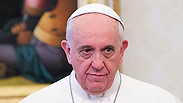
Pope: Holy Land trip is 'strictly religious'
Argentine Jesuit leaves Saturday for three-day visit to Holy Land, where he will meet with refugees; Jordanian, Israeli and Palestinian leaders, and religious leaders of all faiths.
The Argentine Jesuit leaves Saturday for a three-day visit to the Holy Land, where he will meet with Syrian and Palestinian refugees, the Jordanian, Israeli and Palestinian leaders and the chief rabbis of Israel and the mufti of Jerusalem.
The main reason for the visit is to commemorate the 50th anniversary of the meeting between Pope Paul VI and the spiritual leader of the world's Orthodox Christians.
Francis will meet in Jerusalem with the current Orthodox leader, Ecumenical Patriarch Bartholomew I, whom he called his brother.
Israel's top police officer on Sunday vowed that Jewish extremists would not be allowed to spoil the upcoming visit of Pope Francis by vandalizing Christian holy places.
"You cannot exaggerate the importance of this visit on both a national and an international level," Police Commissioner Yohanan Danino told reporters in Jerusalem.
The two-day papal visit to Israel, which begins on May 25, was being treated by police with the same level of importance as that of US President Barack Obama, with an extra 8,000 officers to be deployed throughout Jerusalem, he said.
Politics as usual
Although the Vatican has said the emphasis of the pope's visit is to heal a centuries-old rift between the Catholic and Orthodox worlds, every gesture he makes is likely to come under close scrutiny by both sides.
For Israel, it will be a chance to draw world attention for something other than its ongoing settlement activity.
"The very fact of the visit is a success," an Israeli official told AFP on condition of anonymity, as the tourism ministry said it was hoping the papal pilgrimage would drive a 10 percent increase in Christian tourism.
In fact, the pope's "pilgrimage of prayer", which begins in Jordan on Saturday, will leave a relatively faint footprint in Israel.
His visit to Israel and the Palestinian territories will kick off on Sunday in the southern West Bank city of Bethlehem.
"He is taking a helicopter directly from Jordan to Palestine - to Bethlehem. It's a kind of sign of recognizing Palestine," Father Jamal Khader of the Latin patriarchate in Jerusalem told journalists.
In Bethlehem, the pope will meet Palestinian Authority President Mahmoud Abbas and then celebrate mass in front of the Church of the Nativity, traditional birthplace of Jesus, before visiting a nearby refugee camp.
"Knowing who he is, and his sensitivity for all those who suffer, I am sure that he will say something defending all those who are suffering, including the Palestinians who live under occupation," Khader said.
After a short flight to Tel Aviv's Ben Gurion airport where he will be greeted by President Shimon Peres and Prime Minister Benjamin Netanyahu, he will hold a top-level meeting with Orthodox Church leaders, before spending the night in the residence of the papal nuncio in East Jerusalem.
It is there that he will spend much of May 26, apart from brief forays to pay his respects at the Yad Vashem Holocaust memorial and visit Peres and Israel's two chief rabbis.
He will meet Netanyahu at the Vatican-owned Notre Dame complex, which lies on the seam line between east and west Jerusalem, for talks which will touch on politics, an Israeli official said.
"We shall be able to explain to him, from our point of view, what's happening politically in the region," he said. "We shall explain to him the Iranian threat."
During the visit, the pope is expected to call for a peaceful resolution of the conflict with the Palestinians.
"The purpose of his visit is to encourage us not to be afraid of each other and to talk to each other and live together peacefully," Papal Nuncio Archbishop Giuseppe Lazzarotto told reporters on Sunday.
Any reference he makes to Israeli settlements, to the West Bank separation barrier, or to the question of Palestinian prisoners or refugees will be closely watched by both sides.
AFP contributed to this report










